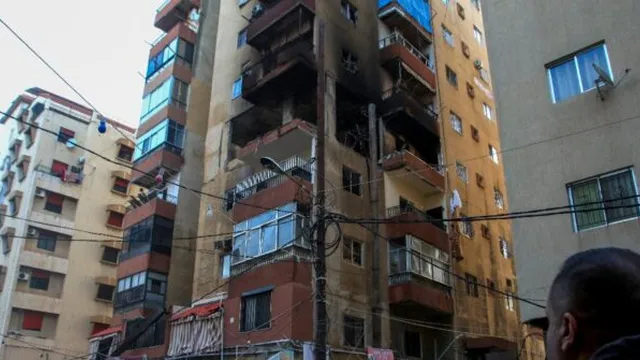
Israeli airstrike kills four in Beirut amid ceasefire tensions
2025-04-04 13:59- Israeli military reported that a strike targeted a Hezbollah operative involved in planning terror attacks.
- The airstrike resulted in four fatalities and seven injuries, indicating serious consequences for Lebanon's civilian population.
- The strike has raised international concerns regarding the stability of the ceasefire and ongoing hostilities in the region.
Express your sentiment!
Insights
In Lebanon, an Israeli airstrike on a building in the southern suburbs of Beirut resulted in the deaths of four individuals and injuries to seven others on April 1, 2025. This attack marked a significant escalation in tensions, occurring despite an existing ceasefire between Israel and the Hezbollah militant group, which had been in place since November 2024. The Israeli military claimed that the assault targeted a Hezbollah operative, Hassan Ali Mahmoud Bdeir, who was allegedly involved in planning a substantial terror attack against Israeli civilians, signaling a potential return to violence in a region already affected by a long-standing conflict. The circumstances surrounding this airstrike were notably tense. Israel had previously initiated an attack on Beirut on March 29, 2025, following the launch of two projectiles from southern Lebanon, which Hezbollah denied. This recent airstrike by the Israeli Air Force (IAF) came during a period of heightened alert, suggesting that Israel was actively responding to perceived threats emanating from Hezbollah's activities. Notably, Bdeir was reported to have been assisting the Palestinian Hamas group in their efforts against Israel, adding complexity to the ongoing regional dynamics and illustrating the interconnected nature of these conflicts. The implications of this strike extend beyond immediate casualties. The Lebanese government condemned the strike, calling it a violation of the ceasefire, while Hezbollah's leadership also condemned the action, describing it as aggression that could escalate tensions further. The Israeli military justified its actions, highlighting the need to address threats to Israeli civilians and asserting that it would continue its operations against Hezbollah to mitigate what it perceives as imminent risks. With multiple perspectives on the situation, the airstrike serves as a reminder of the fragile nature of the ceasefire and the ongoing conflict that has gripped the region. Furthermore, the airstrike has generated calls for international attention and potential intervention, as Lebanon's leadership seeks to confront what it views as continual Israeli aggression. The U.N. has been pressured to respond to these developments, especially in light of the ongoing humanitarian crisis in Gaza and the long-standing calls for justice from the international community regarding actions taken during the conflict. As the situation continues to evolve, both Israel and Lebanon face escalating tensions that threaten to undermine any progress made through diplomatic avenues to achieve stability and peace in the region.
Contexts
The history of conflicts between Israel and Hezbollah is a complex interplay of political, military, and social factors that stretch back several decades. Hezbollah, a Shiite militant group based in Lebanon, was founded in the early 1980s, drawing on the support of Iran and the ideology of Islamic revolution. The foundational relationship between Hezbollah and Iran established a framework for the group's military and political strategies, which would primarily revolve around opposing Israel's actions in Lebanon and supporting Palestinian causes. The group positioned itself as a defender of the Lebanese people against Israeli incursions, primarily in response to the 1982 Lebanon War, during which Israeli forces invaded southern Lebanon, aiming to drive out the Palestine Liberation Organization (PLO). This incursion led to a prolonged period of conflict, and by the end of the 1980s, Hezbollah had emerged as a formidable force in Lebanese politics and military engagement against Israel. The conflict escalated significantly in the year 2000, when Israel withdrew its military forces from southern Lebanon after an 18-year occupation. Hezbollah claimed victory, which bolstered its image and support among the Lebanese and broader Arab populations. This perceived success paved the way for Hezbollah's role in the Israeli-Palestinian conflict as it launched rocket attacks into northern Israel and conducted cross-border raids. The dynamic changed in July 2006, when tensions flared into a full-scale conflict known as the Second Lebanon War. This war was triggered by a cross-border raid by Hezbollah, resulting in the capture of two Israeli soldiers. The ensuing conflict lasted for a month, causing significant casualties on both sides, with widespread destruction in Lebanon and the targeting of Israeli cities. The war ended with a United Nations-brokered ceasefire, but the underlying issues remained unresolved. In the years following the Second Lebanon War, the relationship between Israel and Hezbollah continued to be characterized by sporadic skirmishes and a precarious balance of power. The advent of the Syrian Civil War had a profound impact on Hezbollah, which became directly involved in the conflict, fighting alongside the Assad regime. This involvement enabled Hezbollah to gain military experience and arsenal but also complicated its relationship with Israel as tensions escalated over Hezbollah's entrenchment in southern Syria. Israel has consistently expressed its concerns about the growing military capabilities of Hezbollah, leading to a policy of preemptive strikes against arms transfers and Hezbollah positions near its borders, particularly in the Golan Heights. As of 2025, the situation remains volatile. Ceasefire agreements have, at times, momentarily staved off conflict, but the underlying issues, including territorial disputes and the influence of regional players, have not changed. Both sides possess significant military capabilities, which raises the specter of future conflicts. Hezbollah's resilience, bolstered by its support network and regional allies like Iran, stands in stark contrast to Israel's strategic military advantages. The enduring enmity between the two parties feeds into the larger narrative of Middle East tensions, illustrating how local conflicts can serve as flashpoints for broader geopolitical strife.